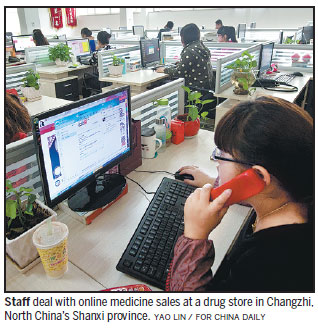Cutting red tape will help expand internet growth
By Meng Fanbin (China Daily) Updated: 2017-08-16 08:50Medical companies will call for a "permit" system to be rolled out so internet pharmacies can expand prescription drug sales online.
Healthcare reforms are opening up the market but more needs to be done, an industry insider has stressed.
Many of the new policies should be included in the 13th Five-Year Plan (2016-20), so as to protect customers and further promote the development of the medical sector.
One crucial move would be for the government to issue permits to online drug stores to cut through the existing red tape.
"A series of reforms in the medical sector, such as abolishing drug subsidy policies, and expanding the two-invoices system can help solve the difficulties and problems of seeing a doctor," said Fu Gang, chairman of Baheal Pharmaceutical Group.
The "two-invoice" rule is complicated and involves one invoice from the pharmaceutical manufacturer to its distributor and another one is sent from the distributor to hospitals that ordered the drugs.
This in turn will reduce prices by cutting through excessive regulations, which at one point involved up to eight invoices, depending on the prescribed medicine.
This procedure is crucial in the fight to stop fake drugs circulating online and to maintain legal access for customers and patients.
"Online drug stores and internet hospitals are part of healthcare industry reforms, and they must be supported by government policies," said Fu, who is also vice-chairman of the China Pharmaceutical Enterprises Association and executive director of China Medical Doctor Association.
The pace of medical reform has increased in the past few years as the healthcare sector expands and modernizes.
Back in May, public hospitals were told to stop the practice of subsidizing medical services with profits from drug sales before Sept 30 this year.
During the past 63 years, this practice has helped pay for the running of public hospitals, but it has now become a drain on patients' pockets.
"The e-commerce companies can shorten drug sale procedures, providing a direct platform for suppliers and buyers," Fu said.
"Advanced technologies, such as big data, cloud computing and artificial intelligence, will improve significantly the medical industry in an all around way," he added.
The government has adopted a step-by-step approach to healthcare reform.
Rolling back red tape and bringing in a streamlined regulatory model have become priorities.
"Although policy changes are a bit slow compared with the fast speed of technology development, I believe they will catch up soon," Fu said.
"In addition, as an aging society, China is in urgent need of a convenient and reliable healthcare service based on the development of intelligent technology."
By the end of 2016, there were 260 million people aged 60 or above, which was 16.6 percent of the total population. It will be essential for this sector of society to have access to a "reliable" healthcare service.
"Purchasing prescription drugs needs professional advice from doctors and is different from clothes or food," Fu said. "But the online shopping habit has already been formed in China.
"Promoting the development of medical e-commerce has already started," he added.
A report from Chinese Academy of Social Sciences showed that total online pharmaceutical sales exceeded more than 3 trillion yuan ($450 billion) from December 2016 to May in 2017. This surpassed the 2014 annual figure.

- 'Cooperation is complementary'
- Worldwide manhunt nets 50th fugitive
- China-Japan meet seeks cooperation
- Agency ensuring natural gas supply
- Global manhunt sees China catch its 50th fugitive
- Call for 'Red Boat Spirit' a noble goal, official says
- China 'open to world' of foreign talent
- Free trade studies agreed on as Li meets with Canadian PM Trudeau
- Emojis on austerity rules from top anti-graft authority go viral
- Xi: All aboard internet express











